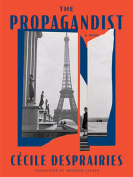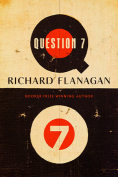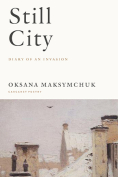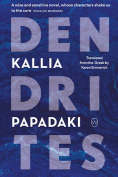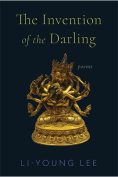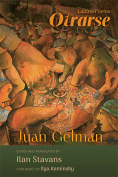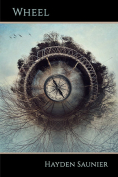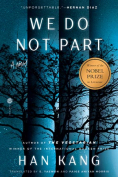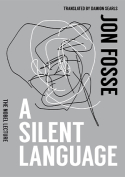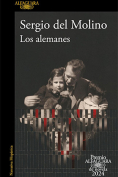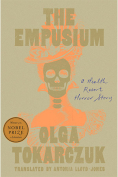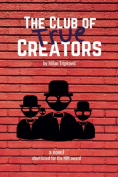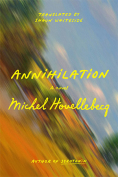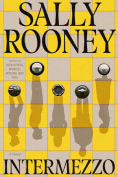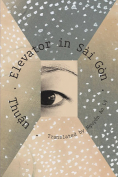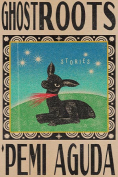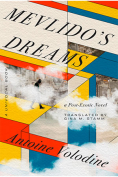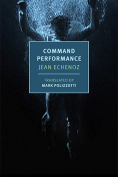Annihilation by Michel Houellebecq
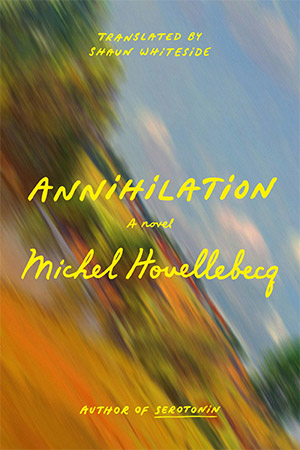 New York. Farrar, Straus and Giroux 2024. 544 pages.
New York. Farrar, Straus and Giroux 2024. 544 pages.
The year 2026 is a tough time for forty-nine-year-old Paul Raison. As a high-ranking official in France’s Ministry of Finance, he is involved with investigations into a series of mysterious computer-generated videos circulating online, depicting terrorist attacks and the beheading of Bruno Juge, finance minister and Paul’s boss. Paul is also preparing Juge to run as a presidential candidate in the upcoming election.
Life at home may be even worse. Paul and his wife, Prudence, though living in the same apartment, lead separate lives and have not had sex or even interacted much in years; in their refrigerator, “total nutritional warfare” rages between Prudence, a zealous vegan, and Paul, an inattentive meat-eater. In the midst of these political and personal tempests, Paul receives word that his seventy-year-old father, Édouard, a retired intelligence official, has suffered a stroke and is in a coma in Lyon. And somewhere in the background are rumblings of discontent—from “towns in the north of France where people have been unemployed for three generations,” from those trapped in “precarious and underpaid jobs, on the edge of slavery.”
Such is the setting at the opening of Michel Houellebecq’s latest—and, according to the author, his last—novel, Annihilation. Like The Elementary Particles (2001), Platform (2004), Submission (2015), and Serotonin (2019) before it, Annihilation focuses on a dispirited middle-aged French man, juxtaposing his personal woes (largely sexual) with broader cultural and historical trends of Western decline.
Unlike its predecessors, though, the narrative progression of Annihilation is not into increased solipsism and isolation but toward empathy and community. Édouard’s coma brings about a fraught family reunion of sorts: Paul; his zealously Catholic sister, Cécile; their younger brother, Aurélien; and Madeleine, Édouard’s significantly younger companion. After Paul’s return to Paris, he and Prudence gradually reconcile and eventually resume having sex, explicitly described with the frankness and male-oriented perspective characteristic of Houellebecqian sex. Meanwhile, Cécile and her husband grapple with unemployment and Aurélien with a vituperative wife and indifferent son. Much of the novel tracks the developing family drama and relationships, including long sections that focus, seemingly without irony, on Aurélien’s attempts to find love. The attention to human relationships is a welcome and unexpected thematic departure for Houellebecq, even if the writing sometimes lacks the deadpan punch of much of his earlier work.
Even as the Raisons find, if not happiness, at least a way to communicate, global political upheaval continues. The elaborately faked videos soon become videos of actual terrorist attacks, first with no loss of life, then deadly. With Submission (and to a lesser extent Platform) in mind, the reader might expect these terrorist attacks to cross from being news items in an information deluge to major disruptions of what Houellebecq depicts as the complacent decadence of modernity. Such a development never quite happens. French intelligence discovers by accident a pentagon/pentagram pattern in the videos and postulates a connection to the Baphomet of Éliphas Lévi, an actual occultic symbol of disputed origin and meaning, accorded a full-page illustration at the beginning of book 4. When three of the attacks are plotted on a map, their points fall on a circle and imply an isosceles triangle, half of an inverted pentagram, a symbol of “the victory of matter over spirit, chaos over order, and more generally the forces of evil over the forces of good” (all of which is explained by a minor comic-relief character in the Finance Ministry).
Two more attacks are predicted. A cheesy, pixelated, two-page illustration of a pentagram superimposed on a map of western Europe, with France at its center, follows. There is an implied connection between the feel-good, seemingly benign Wicca with which Prudence has been dabbling and the unidentified powers behind the terrorist attacks, but this idea is not fully developed, and the whole terrorism strand of the novel ends there with the pentagram episode.
The latter portion of the novel, after the election and the terrorism subplots fade away, is concerned with Paul’s oral cancer and his rapid decline toward death. Paul’s individual fate—for his tumor to “go on devouring his flesh until his annihilation”—seems to correspond in an incompletely articulated way to the terrorists’ apparent desire “to annihilate the modern world” and the self-imposed “deceleration and immobilization of the West, heralding its annihilation.” Perhaps Paul’s surname and Prudence’s given name mark them as an allegorical coupling of raison (reason) and prudence, with Paul’s impending death by cancer representing an end to the age of reason with no comparable principle to replace it. Paul’s cancer, whatever the possible symbolism, is also cancer; the last chapters are filled with details about various specialists and their offices, treatments, exams, prognoses, and the tumor itself, its stench of “decomposing flesh,” a “smell that was even worse than shit.”
Houellebecq is a very good writer, perhaps a great one, but Annihilation is not his finest moment. It manages to be simultaneously, at least in parts, both too long and underdeveloped. The novel takes on so much—terrorism, French presidential elections, the decline of the West, the conflict between men and women, the struggle for sexual dominance, aging parents, the nature of film trilogies, immigration, Wicca and neopaganism, restoration and preservation of French cultural artifacts, hospital regulations, veganism, medical rights, euthanasia, dreams, the urban/rural divide, and even the French automobile industry—that it feels at times scattered or half-formed, and the societal/global and individual strands are not quite woven together as artfully as in Submission or Elementary Particles.
Nonetheless, there is something admirable in Houellebecq’s daring to venture into territory new to him, even if Annihilation leaves readers hoping that the work is not his finale but, as Lanzarote was to Platform, a prelude to something more fully realized.
Eric Vanderwall
Salem, Oregon

